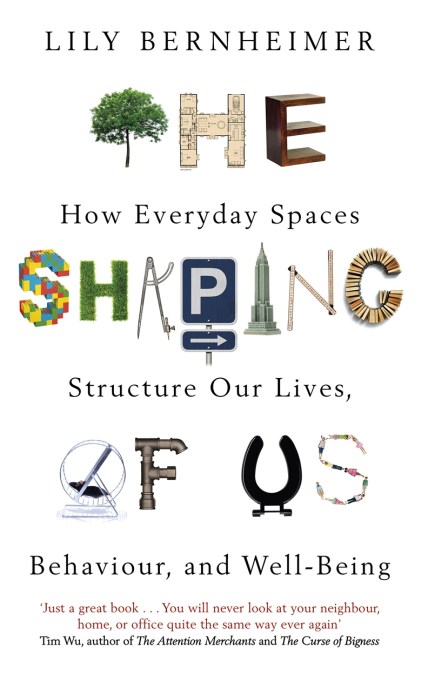The Shaping of Us
On sale
10th October 2019
Price: £12.99
“You are going to be transported by what Bernheimer has to say. You’ll make different decisions and figure out how your brain is working and what should be prioritized in your life” Jo Good, BBC London
What makes everyday spaces work, how do they shape us, and what do they say about us?
The spaces we live in – whether public areas, housing, offices, hospitals, or cities – mediate community, creativity, and our very identity, making us who we are. Using insights from environmental psychology, design, and architecture, The Shaping of Us reveals the often imperceptible ways in which our surroundings influence our behaviour.
Wide-ranging and global examples cover the differences between personalities and nationalities, explore grass-roots and mainstream efforts to build environments promoting well-being, and look ahead to what will become of us if we don’t listen closely to what we know is good for us.
You will learn whether you are a natural ‘prospector’ or ‘refuger’ in the office environment, what roundabouts and stoplights say about British and American culture, whether you are guilty of NIMBYism or being drawn to ‘ruin porn’, and how the half-house may be a common sight in the near future.
The environments we inhabit define our identities – from the earliest moments of our evolution to the worlds we build around ourselves.
What makes everyday spaces work, how do they shape us, and what do they say about us?
The spaces we live in – whether public areas, housing, offices, hospitals, or cities – mediate community, creativity, and our very identity, making us who we are. Using insights from environmental psychology, design, and architecture, The Shaping of Us reveals the often imperceptible ways in which our surroundings influence our behaviour.
Wide-ranging and global examples cover the differences between personalities and nationalities, explore grass-roots and mainstream efforts to build environments promoting well-being, and look ahead to what will become of us if we don’t listen closely to what we know is good for us.
You will learn whether you are a natural ‘prospector’ or ‘refuger’ in the office environment, what roundabouts and stoplights say about British and American culture, whether you are guilty of NIMBYism or being drawn to ‘ruin porn’, and how the half-house may be a common sight in the near future.
The environments we inhabit define our identities – from the earliest moments of our evolution to the worlds we build around ourselves.
Newsletter Signup
By clicking ‘Sign Up,’ I acknowledge that I have read and agree to Hachette Book Group’s Privacy Policy and Terms of Use
Reviews
'Environmental psychologist Bernheimer provides a fascinating introduction to her field in this far-reaching look at how the spaces in which humans live, work, and play affect their behaviour ... Readers will finish this feeling better educated about the role of design and more alert to its impact on everyone's lives' Publishers Weekly
'In this exceptionally readable book, Bernheimer has translated research findings and design practice into a highly engaging account of how we interact with and mold the spaces around us. She shows us that with more thought and imagination, our buildings and cities could provide us with more stimulating, rewarding, and livable environments' David Uzzell, professor of environmental psychology, University of Surrey
'We have built an urban environment for ourselves, and it shapes us in return. In order to become happier and more effective humans, Bernheimer shows us how we must modify our cities, workplaces, and homes. Her book is an ideal introduction to this essential task' Max Jacobson, co-author of A Pattern Language: Towns, Buildings, Construction
'You are going to be transported by what Bernheimer has to say. You'll make different decisions and figure out how your brain is working and what should be prioritized in your life' Jo Good, BBC London
'An analysis of how we could design the whole of our environment to be better... She sets out to entertainingly chart the 20th-century history of research into how where we are shapes who we are. It's a timely volume given the current level of interest in the relationship between buildings and health' Kevin McCloud, Grand Designs magazine
'How do our environments - built, natural, and biological - fit or fail to fit our needs as human beings? Lily Bernheimer takes us on a tour, a tour de force, of illuminating cases, with sage advice for those who design spaces for human beings to live humane lives' George Lakoff, author of Where Mathematics Comes From: How the Embodied Mind Brings Mathematics into Being
'Just a great book. Few things matter more than the spaces we inhabit, and Bernheimer convincingly states the case for design that accepts humanity as we actually are. You will never look at your neighbour, home or office quite the same way ever again' Tim Wu, author of The Attention Merchants and The Curse of Bigness

